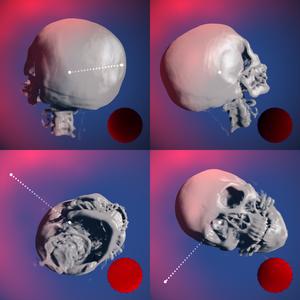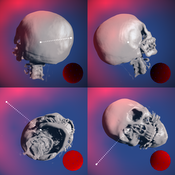Information
- Publication Type: Journal Paper with Conference Talk
- Workgroup(s)/Project(s):
- Date: October 2017
- Journal: Computers & Graphics
- Volume: 67
- Number: C
- Location: Mikulov, Czech Republic
- Lecturer: Eduard Gröller
- Event: SCCG 2017
- Conference date: 15. May 2017 – 17. May 2017
- Pages: 77 – 85
- Keywords: navigation, exploration, medical visualization
Abstract
In visualization systems it is often the case that the changes of the input parameters are not proportional to the visual change of the generated output. In this paper, we propose a model for enabling data-sensitive navigation for user-interface elements. This model is applied to normalize the user input according to the visual change, and also to visually communicate this normalization. In this way, the exploration of heterogeneous data using common interaction elements can be performed in an efficient way. We apply our model to the field of medical visualization and present guided navigation tools for traversing vascular structures and for camera rotation around 3D volumes. The presented examples demonstrate that the model scales to user-interface elements where multiple parameters are set simultaneously.Additional Files and Images
Weblinks
No further information available.BibTeX
@article{mindek-2017-dsn,
title = "Data-Sensitive Visual Navigation",
author = "Peter Mindek and Gabriel Mistelbauer and Eduard Gr\"{o}ller
and Stefan Bruckner",
year = "2017",
abstract = "In visualization systems it is often the case that the
changes of the input parameters are not proportional to the
visual change of the generated output. In this paper, we
propose a model for enabling data-sensitive navigation for
user-interface elements. This model is applied to normalize
the user input according to the visual change, and also to
visually communicate this normalization. In this way, the
exploration of heterogeneous data using common interaction
elements can be performed in an efficient way. We apply our
model to the field of medical visualization and present
guided navigation tools for traversing vascular structures
and for camera rotation around 3D volumes. The presented
examples demonstrate that the model scales to user-interface
elements where multiple parameters are set simultaneously.",
month = oct,
journal = "Computers & Graphics",
volume = "67",
number = "C",
pages = "77--85",
keywords = "navigation, exploration, medical visualization",
URL = "https://www.cg.tuwien.ac.at/research/publications/2017/mindek-2017-dsn/",
}


 Paper
Paper
